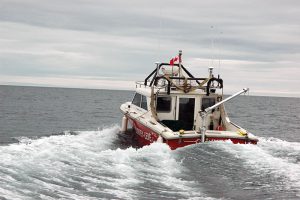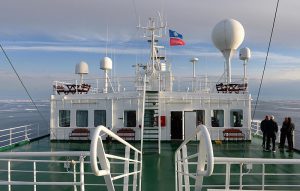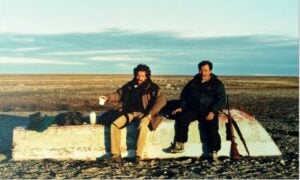
History
2014 Victoria Strait Expedition
This year's search is about much more than underwater archaeology. The Victoria Strait Expedition will contribute to northern science and communities.
- 1205 words
- 5 minutes
This article is over 5 years old and may contain outdated information.
History
An unabridged Q&A about historic significance, benefits to the north and what the future holds

First of all, personally, to me, it’s a great thrill — to be witness to such a monumental development in the study of Canadian history. The ultimate fate of the Franklin expedition is one of Canada’s great mysteries — one of history’s great mysteries. One archeologist has called finding Erebus the biggest discovery since they opened King Tut’s tomb. For anyone who loves the study of history — to know we might be on the cusp of answering one of history’s great questions? Like I said, a thrill — a great thrill. And I can’t wait to see where this discovery leads us.
On a broader note, it obviously means a lot to me also as Prime Minister. It just goes to demonstrate one more time that we’re up to the challenge of mounting significant technical and military operations in the harsh conditions of the Canadian Arctic — something all Canadians can be proud of. And I would add, at a time when international interest in the Arctic region is growing, finding this Franklin ship bolsters Canada’s claim to Arctic sovereignty — clearly something that directly benefits all Canadians.
When I first heard the news, I was extremely proud of our team, many of whom I had met just a few weeks prior as I sailed the Northwest Passage. If only I could have been there for the discovery! Still, I was fortunate to see firsthand their dedication and enthusiasm. It’s really wonderful that all the hard work paid off. I’ve been rooting for them — these modern-day explorers — for so many years now. This is really so terrific for all of them. And, as someone who’s wondered about this mystery for so long, and hoped year after year they’d make a breakthrough, I confess there was a bit of a fist-pump when I found out it had finally happened.
As I’ve said before, Sir John’s exploration and discovery of parts of Canada’s North are an important part of our history and have contributed to Canada becoming the wonderful country we enjoy today. The search for the fabled Northwest Passage is something that Canadians have celebrated in stories and songs for generations — it’s even the subject of the Stan Rogers song that we consider our “unofficial national anthem” — because that story is the story of Canada. Just look at the list of explorers who tried even before Sir John: Cabot, Frobisher, Davis, Cartier, Hudson, La Salle, Cook, Vancouver, MacKenzie. These are the giants of our history, and the story of the search for the Northwest Passage is the essentially the history of Canada’s North. The Franklin expedition is part of that broader story — the most tragic, and most mysterious part, to be sure. For almost 200 years Canadians — not just Canadians, people around the world — have wondered what happened to the Franklin expedition. Now that we’ve found the first of the two ships we can begin unlocking the mystery of what happened to them.
Obviously, the great teamwork between the federal government, the Royal Canadian Navy, the Canadian Coast Guard, the Royal Canadian Geographical Society and the Arctic Research Foundation played a significant role. Since 2008, there have been six major Parks Canada-led searches for the lost Franklin ships, painstakingly covering many hundreds of square kilometres of the Arctic seabed. But before that, generations of explorers have searched for whatever remains of the Franklin expedition. So, in that context, our friends at Parks Canada have accomplished quite a lot in a fairly short period of time.
The discovery of the wreck is something all Canadians can be proud of, especially Northern Canadians. And of course, the North has always been a priority for our government. But it’s clear that, while the discovery of Erebus is a great new chapter in Canadian history, the act of searching has done much to benefit not just Northerners, but all Canadians. For example, the search for the wreck has required us to map extensive sections of the seabed, and conduct intensive research on sea ice and the Arctic waters. All of the knowledge and data we’ve gained will help us to better understand the geography of the North, and give us a better understanding of how to navigate these waters. We’ve also invested in the Royal Canadian Navy, the Canadian Coast Guard and the Canadian Rangers, who are our eyes and ears on the ground in the North; in addition to our investments in Northern infrastructure. A great deal of what we know about our North comes from observations made by other explorers trying to solve the Franklin mystery, going back almost two centuries. Our searchers are the inheritors of that legacy.
Sir John was trying to achieve a specific goal — the Pacific Ocean. But the route he took was obviously just as important. For us too, the journey has been as important as the destination.
I think the first step here is to get a better understanding of exactly what happened. Of course, the loss of those 129 men and officers weighs on everyone involved and certainly all those who know their story. For me, sailing the Northwest Passage this past August really put into perspective the conditions and challenges those men faced once they realized their voyage was doomed. But no mistake — these men were heroes. They sailed into impossibly unforgiving territory, with bravery and determination. For all they knew, what they were looking for may not have existed, but if it did, they were going to do everything they could to find it. And, when you think about it, so much more Northern exploration — even the fact that a Northwest Passage was possible — came as a result of other explorers searching for Franklin. It was the “Age of Sail,” at time when great rewards awaited those willing to take great risks, when fortune favoured the bold. Again, that’s more than just the story of Franklin — it’s the story of Canada.
Obviously, this is not the end but the beginning. Now that we’ve found and identified HMS Erebus, we now need to find HMS Terror. Finding Erebus has provided us with the momentum, and new information, necessary to locate its sister ship and find out even more about what happened to the Franklin expedition’s crew. Maybe we’ll find Sir John himself. Or his journals — that would be an incredible find. There’s still a lot of mystery to be solved — there’s certainly a lot more that we don’t know than we do know — but one thing we do know is that we’re on the right track.
Are you passionate about Canadian geography?
You can support Canadian Geographic in 3 ways:

History
This year's search is about much more than underwater archaeology. The Victoria Strait Expedition will contribute to northern science and communities.

History
First official day of the 2014 search for Sir John Franklin’s lost ships

History
Arctic historian Ken McGoogan takes an in-depth, contemporary perspective on the legacy of Sir John Franklin, offering a new explanation of the famous Northern mystery

People & Culture
On April 12, Franklin enthusiasts had a rare opportunity to come together in the same room as The Royal Canadian Geographical Society presented their 2016 Can Geo Talks